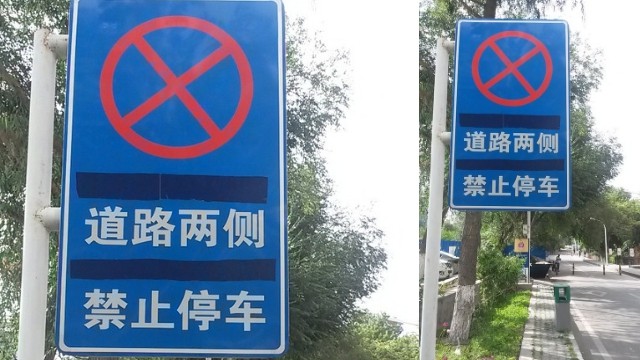The ‘patriotism’ of not speaking Uyghur

Urumqi No. 1 Primary school, 2018: Uyghur script “disappeared.”
Photo by Joanne Smith Finley
Uyghur “patriotism” now requires the active disavowal of the Uyghur way of life. Vague euphemisms like “patriotism,” “harmony,” “stability,” “vocational training,” and “poverty elimination” gaslight the erasure of a native system of knowledge and the basic elements that make Uyghur life Uyghur: language, religion, and culture.
On October 27, 2018, Memtimin Ubul, a Communist Party deputy secretary of Kashgar’s Qaghaliq County, stated publicly something that had increasingly become the norm over the past two years in the Uyghur homeland. In the Xinjiang Uyghur Autonomous Region, it was now officially unpatriotic for Uyghur state employees to speak or write in Uyghur language. In a statement that was circulated to more than 750,000 readers, the ethnically Uyghur state official wrote that any state employee who spoke Uyghur in public “should be classified as a ‘two-faced person.’” This is a charge that has resulted in the detention of hundreds, if not thousands, of Uyghur public figures, in addition to the untold number (possibly more than a million) who have been sent to “transformation through education” prison camps.
Memtimin wrote that the patriotic duty of state employees extended throughout all aspects of their lives. Patriotism should be present in the way they dressed, talked, and ate. Even in one’s home life, Uyghurs should refuse to speak Uyghur and instead speak Chinese. From his perspective, government employees had the “highest levels of knowledge and culture” in Uyghur society, and as such they had “immeasurable social influence.” It was therefore up to them to demonstrate what it meant to be patriotic Uyghur citizens. “Speaking the ‘language of the country’ should be the minimum requirement for patriotism,” he wrote. Chinese was no longer the language of Han people, but the language of reeducated patriotic Uyghurs.
A short documentary on rural Uyghur life in the county where Memtimin Ubul works as Party official. The documentary demonstrates the richness of Uyghur rural traditions before the mass detention of Uyghurs and the rise of new forms of “patriotism” across the Uyghur homeland.
Why Chinese?
From the perspective of state authorities such as Memtimin, learning the “national language” (国语 guóyǔ; Uy: dolet tili), which had previously been known as “the Han language” (汉语 hànyǔ; Uy: Hanzuche), was important for a number of reasons. First, and most importantly from Memtimin’s perspective, he said it aided the fight against religious extremism. By emphasizing Chinese as a test of patriotism, he argued that Uyghurs would “finally break free from the shackles of religion” — a statement that ignores the fact that millions of Chinese-speaking citizens, the Hui, remain devout Muslims.
A second reason for embracing Chinese was that it would lead to a new kind of “cultural self-confidence” when it came to Uyghurs performing “Chinese traditional culture.” By embracing Han cultural traditions, Uyghurs would claim their Chineseness more fully. They would learn “basic quality” (基础素质 jīchǔ sùzhì), which he associated with Han cultural knowledge.
This led to the third reason why Uyghurs should only speak Chinese: Doing so would allow them to “freely pursue a blessedly modern civilized life under the clear sky.” It would offer them a path to work in the Chinese economy.
One example of a concrete benefit of embracing Chineseness: They would be able to interact with the hundreds of thousands of Han “relatives” who monitored their behavior, encouraged language learning, and provided them with modern conveniences. Memtimin wrote that through this process, many Uyghur farmers had been given advanced household appliances by the state, such as expensive multifunctional washing machines. Why, he wrote, do these machines sit “abandoned in the corner?” To his thinking, it was because the “farmers cannot understand the Chinese character manual,” a statement that ignores the resentment that Uyghurs feel toward the Han “relatives” who occupy their homes and the way many view such appliances as machines that waste water.
In general, Memtimin argued, learning Chinese would aid Uyghurs in the “poverty alleviation” that, according to a declaration from Xi Jinping, was to come by 2020. Chinese language learning would allow Uyghurs to fully embrace new lifestyles in government housing, in government-subsidized cottage industries, government-sponsored animal husbandry, and relocation to Han majority areas.
Since the beginning of the “People’s War on Terror,” Mandarin Chinese has been referred to almost exclusively as the “national language” in official texts — the language of the nation, of patriotism — as opposed to merely “the Han language.”
Indeed, one of the central goals of the mass internment camps that hold Uyghurs in extrajudicial detention is language training. Over and over, detainees who feature in state propaganda videos speak about how learning the “national language” has freed them from their “extremist thoughts.” Detainees speak Chinese with “vigor and enthusiasm,” while also having developed skills in Chinese calligraphy. One observer noted that even their “spirit” seemed to be transformed through their imprisonment and the prohibition of Uyghur speech. Through indoctrination in the camps, they learned to talk in Chinese about “civilization, hygiene, morality and law.”
The reason the detainees were in the prison camps in the first place was “to learn the national language, law, and skills,” as one state observer noted. “We have seen that some of the ‘students’ have been able to master more than 3,000 characters. Now they can read newspapers, they use very good pronunciation, and can talk to us fluently.
“A ‘trainee’ told us: ‘In the past, we were influenced by religious extreme thoughts. We didn’t study the common language of the country. When we got to ‘the center,’ we became more and more fond of learning the common language of the country. Now I feel very happy! Thanks to the Party and the government for saving us!’”
Language training extends beyond the camps to the factories that are being built as part of the “poverty alleviation” program for the family members of detainees and prisoners and other targeted populations. As one document puts it, one of the primary goals of these facilities is training in basic “quality” (素质 sùzhì) which is defined by understanding the “common language” (通用语言 tōngyòng yǔyán), their legal obligations, and the tenets of productive discipline. As another document noted, the private companies that were subsidized to use Uyghur forced labor “not only will guide (minority workers) in operational discipline, but also assumes responsibility for teaching them the Han language and life skills.”
According to state media, in rural Uyghur areas there is now a Chinese language learning fervor. As the Xinjiang Daily noted, Uyghur children are now teaching their grandparents how to speak with correct tones.
I spoke recently to a Uyghur contact about the pressure her mother felt to learn Chinese, a retiree who lives in a rural Uyghur village. My contact said that the last time she was able to get some news from her home village, she said it had become the primary focus of her mother’s life. She said, “I asked my cousin, ‘How is my mom?’ She said that every day my mom is learning ‘the language of the country,’ and writes a few thousand Chinese characters from a book as her homework. She said, ‘She is busy, don’t worry.’ I am happy she is not in the camp, but basically she is spending the whole day mimicking characters, as she doesn’t know any Chinese. Every week at the (village) flag raising, she has to bring her ‘homework’ to show the leaders.”
Chinese as the national language
On three occasions, Memtimin slipped up and called Chinese the “Han language” (汉语 hànyǔ). In most references though, he remembered to refer to it the “national language” (国语 guóyǔ). This term, or the terms “common language” (sometimes referred to as 普通话 pǔtōnghuà, i.e., Mandarin) or the “common language of the country” (国家通用语言 guójiā tōngyòng yǔyán), became the preferred terms only in the past four years, since the beginning of the “People’s War on Terror.” Prior to this, Chinese was referred to almost exclusively as the language of Han people in Uyghur speech (Uy: Hanzuche). Now, though, Chinese is the language of the nation, the language of patriotism.
In dozens of government documents that touch on contemporary language policy in Xinjiang, the word “Han language” was used in the phrasing only once. Chinese was referred to almost exclusively as the “national language” and “common language.”
Near the end of his essay, Memtimin acknowledged that “some people may say that learning to use Mandarin would destroy Uyghur language and traditional culture.” Then, ignoring the fact that Uyghur language instruction has nearly been eliminated from Uyghur schools, that hundreds of books have been banned, and Uyghur language publishing has ground to a halt, he argued that the state had not “stopped” Uyghur language learning, which remains a “right” all citizens possess; the state was simply advocating that Uyghurs “learn the strengths of all ethnic groups, especially the outstanding ethnicities.”
According to Memtimin, Uyghur knowledge is degraded knowledge steeped in Islam. It means not only that Uyghurs are less than the “outstanding” Han, but also that they will forever remain “shackled” to a religion that state authorities have come to view as a “mental illness.” From this perspective, excising Uyghur language from their minds is the only way to fully access Chinese patriotism. This is the kind of patriotism that will keep Uyghurs out of the prison camps.
In Xinjiang, Chinese is increasingly the only permitted language. This purging of language publicly began with Arabic. The most notable way this was done was through the elimination of the common Arabic greeting “Peace be unto you.” Then the state eliminated Arabic-sounding names. Then they erased the Arabic in restaurant signage and mosques.
Now, Uyghur script is being erased from street signs and wall murals.

Memtimin’s essay is an example of the way Uyghurs have been compelled to profess “vows of loyalty” (发声亮剑 fāshēng liàngjiàn; Uy: ipade bildürüsh) to the state. These statements force Uyghurs to articulate views that are often not their own. The statements ask them to re-narrate their personal biographies in a way that emphasizes undying loyalty to the state. They strongly resembled the personal statements that many were forced to publicly declare during the waves of Maoist class struggle and thought reform in the 1950s, but in this case they are directed only at Uyghur ways of life and directly oriented toward Han state culture.
In the language of a totalitarian regime, Uyghur “patriotism” now requires the active disavowal of the Uyghur way of life. In the Uyghur homeland, political speech and writing has become the defense of the indefensible. Vague euphemisms like “patriotism,” “harmony,” “stability,” “vocational training,” and “poverty elimination” gaslight the erasure of a native system of knowledge and the basic elements that make Uyghur life Uyghur: language, religion, and culture. Even Uyghur family life is threatened by a state that actively separates children from their parents or forbids parents from teaching their children significant elements of what it means to be a Turkic Muslim.
In a process similar to North American attempts to eliminate Native American language, faith, and culture in the 19th and 20th centuries, the Chinese state is now asking Uyghurs to claim new forms of Chineseness and reject their own traditions. The language of “patriotism” and other vague euphemisms allows state authorities to name their priorities without conveying an image of violence — the one they are exacting.
Darren Byler’s Xinjiang Column is published on the first Wednesday of every month. Previously:
‘As if you’ve spent your whole life in prison’: Starving and subdued in Xinjiang detention centers






